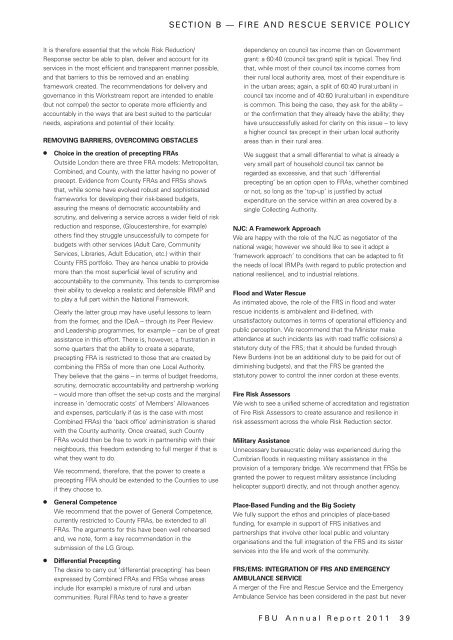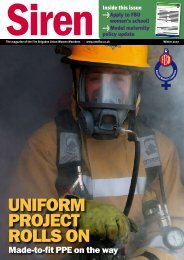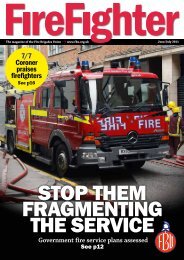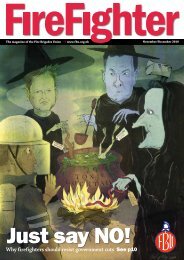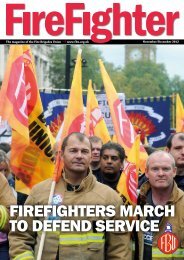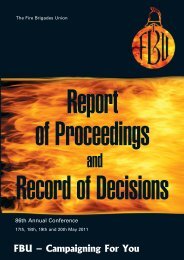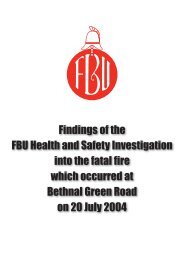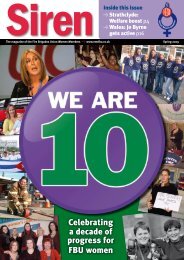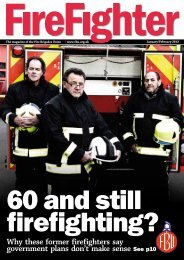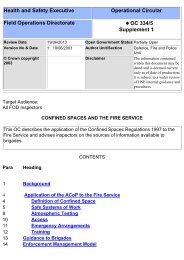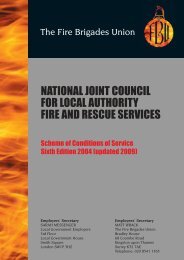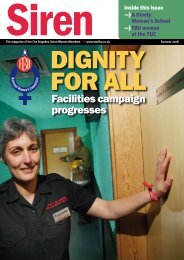Report - Fire Brigades Union
Report - Fire Brigades Union
Report - Fire Brigades Union
Create successful ePaper yourself
Turn your PDF publications into a flip-book with our unique Google optimized e-Paper software.
SECTION B — FIRE AND RESCUE SERVICE POLICY<br />
It is therefore essential that the whole Risk Reduction/<br />
Response sector be able to plan, deliver and account for its<br />
services in the most efficient and transparent manner possible,<br />
and that barriers to this be removed and an enabling<br />
framework created. The recommendations for delivery and<br />
governance in this Workstream report are intended to enable<br />
(but not compel) the sector to operate more efficiently and<br />
accountably in the ways that are best suited to the particular<br />
needs, aspirations and potential of their locality.<br />
REMOVING BARRIERS, OVERCOMING OBSTACLES<br />
● Choice in the creation of precepting FRAs<br />
Outside London there are three FRA models: Metropolitan,<br />
Combined, and County, with the latter having no power of<br />
precept. Evidence from County FRAs and FRSs shows<br />
that, while some have evolved robust and sophisticated<br />
frameworks for developing their risk-based budgets,<br />
assuring the means of democratic accountability and<br />
scrutiny, and delivering a service across a wider field of risk<br />
reduction and response, (Gloucestershire, for example)<br />
others find they struggle unsuccessfully to compete for<br />
budgets with other services (Adult Care, Community<br />
Services, Libraries, Adult Education, etc.) within their<br />
County FRS portfolio. They are hence unable to provide<br />
more than the most superficial level of scrutiny and<br />
accountability to the community. This tends to compromise<br />
their ability to develop a realistic and defensible IRMP and<br />
to play a full part within the National Framework.<br />
Clearly the latter group may have useful lessons to learn<br />
from the former, and the IDeA – through its Peer Review<br />
and Leadership programmes, for example – can be of great<br />
assistance in this effort. There is, however, a frustration in<br />
some quarters that the ability to create a separate,<br />
precepting FRA is restricted to those that are created by<br />
combining the FRSs of more than one Local Authority.<br />
They believe that the gains – in terms of budget freedoms,<br />
scrutiny, democratic accountability and partnership working<br />
– would more than offset the set-up costs and the marginal<br />
increase in ‘democratic costs’ of Members’ Allowances<br />
and expenses, particularly if (as is the case with most<br />
Combined FRAs) the ‘back office’ administration is shared<br />
with the County authority. Once created, such County<br />
FRAs would then be free to work in partnership with their<br />
neighbours, this freedom extending to full merger if that is<br />
what they want to do.<br />
We recommend, therefore, that the power to create a<br />
precepting FRA should be extended to the Counties to use<br />
if they choose to.<br />
dependency on council tax income than on Government<br />
grant: a 60:40 (council tax:grant) split is typical. They find<br />
that, while most of their council tax income comes from<br />
their rural local authority area, most of their expenditure is<br />
in the urban areas; again, a split of 60:40 (rural:urban) in<br />
council tax income and of 40:60 (rural:urban) in expenditure<br />
is common. This being the case, they ask for the ability –<br />
or the confirmation that they already have the ability; they<br />
have unsuccessfully asked for clarity on this issue – to levy<br />
a higher council tax precept in their urban local authority<br />
areas than in their rural area.<br />
We suggest that a small differential to what is already a<br />
very small part of household council tax cannot be<br />
regarded as excessive, and that such ‘differential<br />
precepting’ be an option open to FRAs, whether combined<br />
or not, so long as the ‘top-up’ is justified by actual<br />
expenditure on the service within an area covered by a<br />
single Collecting Authority.<br />
NJC: A Framework Approach<br />
We are happy with the role of the NJC as negotiator of the<br />
national wage; however we should like to see it adopt a<br />
‘framework approach’ to conditions that can be adapted to fit<br />
the needs of local IRMPs (with regard to public protection and<br />
national resilience), and to industrial relations.<br />
Flood and Water Rescue<br />
As intimated above, the role of the FRS in flood and water<br />
rescue incidents is ambivalent and ill-defined, with<br />
unsatisfactory outcomes in terms of operational efficiency and<br />
public perception. We recommend that the Minister make<br />
attendance at such incidents (as with road traffic collisions) a<br />
statutory duty of the FRS; that it should be funded through<br />
New Burdens (not be an additional duty to be paid for out of<br />
diminishing budgets), and that the FRS be granted the<br />
statutory power to control the inner cordon at these events.<br />
<strong>Fire</strong> Risk Assessors<br />
We wish to see a unified scheme of accreditation and registration<br />
of <strong>Fire</strong> Risk Assessors to create assurance and resilience in<br />
risk assessment across the whole Risk Reduction sector.<br />
Military Assistance<br />
Unnecessary bureaucratic delay was experienced during the<br />
Cumbrian floods in requesting military assistance in the<br />
provision of a temporary bridge. We recommend that FRSs be<br />
granted the power to request military assistance (including<br />
helicopter support) directly, and not through another agency.<br />
●<br />
●<br />
General Competence<br />
We recommend that the power of General Competence,<br />
currently restricted to County FRAs, be extended to all<br />
FRAs. The arguments for this have been well rehearsed<br />
and, we note, form a key recommendation in the<br />
submission of the LG Group.<br />
Differential Precepting<br />
The desire to carry out ‘differential precepting’ has been<br />
expressed by Combined FRAs and FRSs whose areas<br />
include (for example) a mixture of rural and urban<br />
communities. Rural FRAs tend to have a greater<br />
Place-Based Funding and the Big Society<br />
We fully support the ethos and principles of place-based<br />
funding, for example in support of FRS initiatives and<br />
partnerships that involve other local public and voluntary<br />
organisations and the full integration of the FRS and its sister<br />
services into the life and work of the community.<br />
FRS/EMS: INTEGRATION OF FRS AND EMERGENCY<br />
AMBULANCE SERVICE<br />
A merger of the <strong>Fire</strong> and Rescue Service and the Emergency<br />
Ambulance Service has been considered in the past but never<br />
FBU Annual <strong>Report</strong> 2011 39


